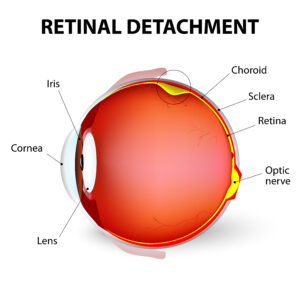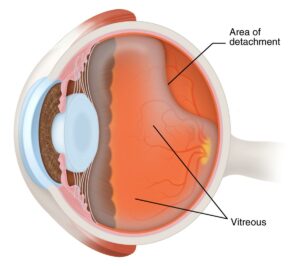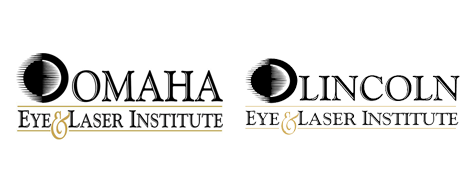Your retina is a vital part of your eye. When light passes through the eye, it hits a thin layer at the back that contains photoreceptor cells.
These photoreceptors send impulses through the optic nerve to the brain in the form of images you can understand. Without your retina, you wouldn’t be able to see. When anything damages your retina, it can threaten your vision.
Sometimes, damage to the retina happens slowly over time due to eye conditions like macular degeneration. Sometimes, though, damage can happen quite quickly.
While rare, it is possible for your retina to become detached from the back of your eye. When it comes to a retinal detachment, the threat to your vision is immediate and should be treated as a medical emergency.
Keep reading to find out why a retinal detachment is a medical emergency!
What is a Retinal Detachment?

A retinal detachment occurs when the clear part of the retina detaches from the pigment layer. When detached, the photoreceptor cells on the retina cannot function properly.
If left untreated, a detachment can lead to total vision loss. Even a tear or partial detachment can cause irreversible gaps in your vision.
Causes of a Retinal Detachment
As you age, the clear gel that fills your eye, called the vitreous, can begin to shrink. As it shrinks, it can pull on the retina.
Usually, this pulling isn’t enough to detach the retina, but sometimes the tension is too high. When pulled hard enough, the retina can get detached or torn from the back of your eye.
Symptoms Associated with Having a Retinal Detachment
Symptoms of a retinal detachment include:

- Blurred vision
- Partial vision loss
- Light sensitivity
- Flashes of light
- The sudden appearance of spots or floaters in your vision
- Tunnel vision
- A shadow in your visual field
It’s common for those that are older to have some spots in their vision due to particles that build up in the vitreous. But when you suddenly start seeing a lot more spots, it’s almost always a sign that there’s been damage to your retina.

These are more commonly known as flashes or floaters. If you experience this, along with any of the other symptoms mentioned above, seek medical treatment right away. The sooner that you treat a potential retinal detachment, the more likely you can have your vision saved.
Diagnosis and Treating a Retinal Detachment
If you experience the symptoms listed above, it’s very likely you’ve had a retinal detachment. But you need a proper diagnosis before you can receive treatment.
If you go to the hospital, a doctor may diagnose you and then refer you to a specialist for treatment. The important thing is that you seek help right away as prompt treatment is necessary to save your vision.
What kind of treatment you need depends on the severity of the detachment. If you have a small retinal detachment, they are often treatable with laser therapy.
More serious detachments have to be treated through surgery. There are three primary retinal detachment surgical solutions.
They include scleral buckling, pneumatic retinopexy, and a vitrectomy. Your eye doctor may decide to perform one of these procedures depending on the severity of the detachment. It may also depend on the current position of the retina.
Vitrectomy
A vitrectomy is for more than treating retinal detachments and works by taking pressure off the retina. In the case of a retinal detachment, a vitrectomy involves removing some of the vitreous gel in your eye and replacing it with gas.

The gas then pushes the retina back into place. Eventually, your body will reabsorb the gas, leaving the retina where it needs to be.
Pneumatic Retinopexy
Pneumatic retinopexy is another procedure that’s like a vitrectomy. But instead of removing part of the vitreous first, your surgeon will inject a small bubble of gas directly into the eye.
This bubble is big enough to pin the retina back against the sclera. The sclera is the layer of tissue that surrounds the eye.
Any tear in the retina is then sealed into place. The tear may also be sealed before injecting the gas bubble. This will depend on how accessible the tear in the retina is. Once the retina is back in the right place, it stays in place after the gas gets reabsorbed into the body.
Scleral Buckling
Scleral buckling is a procedure that uses a device called a scleral buckle. A scleral buckle is a belt-like band that’s placed around the sclera.
When placed and tightened, the pressure forces the retina back into place against the sclera. Your surgeon can then leave the buckle in the eye.
It won’t be visible and it will keep the retina from detaching again. Your surgeon may also opt to remove the scleral buckle at a later time.
Whether it’s removed, though, the procedure reduces traction on the retina from the vitreous. By reducing this traction, it lowers the patient’s risk for another detachment.
A retinal detachment is a serious condition that requires prompt treatment. But when you receive proper treatment, it’s very likely your retina can be successfully reattached.
Reattachment procedures have high success rates with patients. Although it is possible to not be able to reattach the retina, this is rare and unlikely.
For the best possible results, get a retinal detachment diagnosed and treated. This will increase your odds at a full recovery, and of being able to keep your vision.
Concerned you may have had a retinal detachment? Schedule an appointment at Omaha Eye & Laser Institute in Omaha, NE, today!





